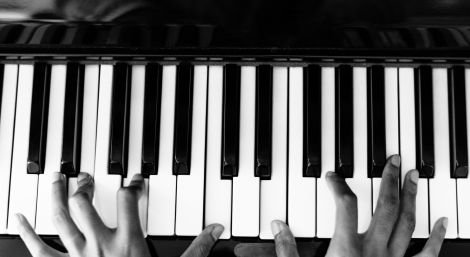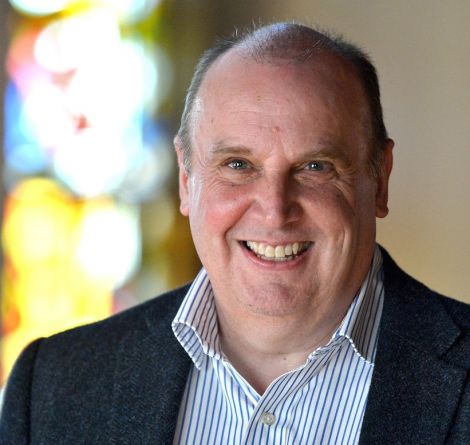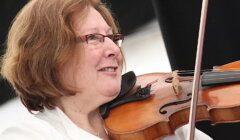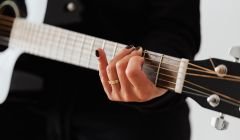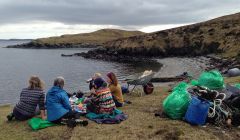Council / Education chief in tune with call for free music tuition
Councillor George Smith said ‘ideally we’d not like to have any charges at all’.
THE SCOTTISH Government should stump up more money to allow local authorities to deliver free music tuition in schools, according to the chairman of Shetland Islands Council’s (SIC) education and families committee.
Councillor George Smith admitted it would be “very, very difficult” at the moment for the SIC to reconsider a decision made in 2010/11 to charge for instrument lessons because the money it receives from the government to run its core services continues to reduce.
It comes after the Scottish Parliament’s education and skills committee recommended that music tuition across the country should be free because lessons are becoming “increasingly unaffordable”.
At the moment pupils in Shetland are charged £200 a year per instrument for lessons, while group instruction is set at £150 per instrument.
This optional service is on top of the music lessons pupils in Shetland receive each week as part of the curriculum.
There is no charge for instrument tuition for schoolchildren who are entitled to free school meals and/or the clothing grant, as well as pupils in secondary four or above who are completing their SQA national qualification in music. The council can also loan pupils instruments.
Shetland’s rich musical heritage has benefitted from pupils receiving tuition in addition to their usual curriculum since the 1960s.
Currently 720 pupils receive instrumental tuition, a decrease of only 55 from when fees were imposed in 2010/11 despite a campaign from locals.
Since then, however, there are less music tutors on the books and combined school rolls for primary and secondary have fallen by around three per cent.
For the current school year applications are invited for children who are primary five and above, and the first term is free for pupils who have never received tuition before. Availability, however, is limited in some areas, and there are some waiting lists.
Become a member of Shetland News
The council currently provides instruction for around 20 instruments, from staples like accordion and fiddle to drums, flute, keyboard, saxophone and tuba.
Guitar, meanwhile, is available in some schools for primary five to seven pupils through the Scottish Government’s Youth Music Initiative.
Pupils who pay for tuition receive a minimum of 30 lessons per session from August to July, each lasting 25 minutes.
While Shetland charges £200, the highest cost of music tuition in Scotland can be found in Clackmannanshire, where a fee of £524 is levied.
The cross-party parliament education and skills committee heard that 25 of Scotland’s 32 councils now charge for instrument tuition, with neighbouring Orkney one of those which do not.
One local authority has seen a drop of nearly 70 per cent in pupils receiving tuition after it introduced its charge.
Convener Clare Adamson said: “There is little doubt about the positive benefits that music can have on us as individuals, as communities and indeed to the wider Scottish culture and economy.
“However, for too many young people, these opportunities are being lost because of increasingly unaffordable fees. This is why our committee believes in the principle that music tuition should be free.”
The SIC’s education committee chief Smith said while he fully acknowledged the value in music instruction, the council had to impose charges because of the “cuts we’ve seen in our revenue budgets over the years”.
He added that the local authority is still “picking up a fairly substantial cost” in paying for tutors despite the charge.
“If the Scottish Government value music instruction in the same way as we do, and the same way as the MSPs suggest, then it would be really good if they gave us more money, so it can be free across the whole of Scotland,” Smith said.
“It’s great that MSPs recognise the value of it, but they then need to put their money where their mouth is and give us the resources that will allow us to provide it free of charge to everybody.”
He pointed to an indicative 2.2 per cent real terms reduction in core funding for 2019/20 as a further example of how the council continues to be forced into difficult decisions when it comes to balancing the books.
“At the end of the day, we’re doing the very best we can to make sure that we use our resources as effectively as we can, and there’s always choices to be made,” Smith said.
“We’ve tried to keep the costs down – ideally we’d not like to have any charges at all – but we’ve tried to keep them reasonable.”
Scottish teaching union EIS, meanwhile, has called on the Scottish Government and local authorities to take up the parliament committee’s recommendations.
“The EIS support arts and culture as a means of enriching the lives of Scotland’s children and recognises that the young people who engage with instrumental music at school will be Scotland’s musicians of the future so we must invest in them now,” general secretary Larry Flanagan said.
Multi-instrumentalist Norman Willmore, known for his saxophone playing, left Shetland around five years ago to study jazz at the Royal Welsh College of Music & Drama in Cardiff.
While he was taught piano and saxophone outside of school, he said music tuition provides more than just lessons about an instrument.
“Maybe £200 a year for lessons is actually quite cheap in comparison to other extra curricular activities, but I can see why it is enough to put parents off,” Willmore said.
“Music [instrument] lessons shouldn’t be seen as ‘extra’ curricular because of all the transferable life skills it teaches you, like self motivation, perseverance, patience, understanding patterns, working in groups, creativity, and communication skills.
“All these skills definitely help across all areas of a child’s education, and helps them to be rounded adults.”
Become a member of Shetland News
Shetland News is asking its readers to consider paying for membership to get additional perks:
- Removal of third-party ads;
- Bookmark posts to read later;
- Exclusive curated weekly newsletter;
- Hide membership messages;
- Comments open for discussion.
If you appreciate what we do and feel strongly about impartial local journalism, then please become a member of Shetland News by either making a single payment, or setting up a monthly, quarterly or yearly subscription.






